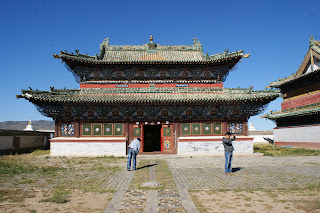For those who have traveled internationally and crossed the International Dateline, this post will be "old hat." For me, today was a new hat. I mentioned early on that I'd never crossed the Int'l Dateline before, and I was sure it would be an experience.
Going to Mongolia, it wasn't that big of a deal. Mongolia is twelve time zones ahead of Lexington, Kentucky. In other words, 1 p.m. on Monday in Lexington is 1 a.m. on Tuesday in Mongolia.
Coming back to the US, however, this difference takes on some rather bizarre twists. Like today, for example.
I left Ulaanbaatar, Mongolia's Chinggis Kahn International Airport at 6:45 a.m. Sunday morning. That's 6:45 p.m. Saturday in Lexington. I saw a beautiful Sunday sunrise as we took off. I landed in Incheon, South Korea at 10 a.m. Sunday. After a 7 hour layover, I flew from South Korea to Detroit at 5:20 p.m. Sunday.
We headed due north around North Korea and over China. Near the China/Russia border, the sun sat on Sunday evening. A few hours later we crossed the dateline and were in the pre-dawn hours of Sunday morning again! (You may be wondering how I knew where we were. On the Boeing 777, each seat has a Video on Demand tv screen. There's an option to track the flight. A world map appears and shows where the plane is at any given moment. Voila! A flight tracker.)
As we flew near the northern tip of Alaska above the Arctic Circle, I saw another beautiful sunrise...Sunday morning again! At 5:30 p.m. we had flown south down through Canada and landed at Detroit. That's right. We left Incheon at 5:20 p.m. Sunday and landed in Detroit 10 minutes and 11 time zones later.
We fly out of Detroit at 8:04 p.m. and I saw the sunset again on Sunday evening and landed in Lexington at 9:30 p.m. Sunday. As Jackie and I were heading from the airport to our home in Lexington, I received an email from Hatnaa in Mongolia - 10 a.m. on Monday morning in Ulaanbaatar.
I lived September 30th for 30 hours, saw two sunrises and sunsets on the same day and got an email from Hatnaa on October 1st. My head is spinning around and around and I'm not sure what day or hour or where exactly I am, but I know I've lived it all before...deja vu all over again.
I'll be contemplating this experience for a long, long time. Thanks to everyone for the prayers and well-wishes. I had a Sunday I'll never forget...and I haven't even told half the story. For example, I was denied boarding in Mongolia three times and once in Incheon. However, I managed to get on the plane, fly home AND my luggage arrived safe and sound. I'm counting my blessings! More on that later...and it is a funny and sobering story for another blog post.
I'M HOME.
Going to Mongolia, it wasn't that big of a deal. Mongolia is twelve time zones ahead of Lexington, Kentucky. In other words, 1 p.m. on Monday in Lexington is 1 a.m. on Tuesday in Mongolia.
Coming back to the US, however, this difference takes on some rather bizarre twists. Like today, for example.
I left Ulaanbaatar, Mongolia's Chinggis Kahn International Airport at 6:45 a.m. Sunday morning. That's 6:45 p.m. Saturday in Lexington. I saw a beautiful Sunday sunrise as we took off. I landed in Incheon, South Korea at 10 a.m. Sunday. After a 7 hour layover, I flew from South Korea to Detroit at 5:20 p.m. Sunday.
We headed due north around North Korea and over China. Near the China/Russia border, the sun sat on Sunday evening. A few hours later we crossed the dateline and were in the pre-dawn hours of Sunday morning again! (You may be wondering how I knew where we were. On the Boeing 777, each seat has a Video on Demand tv screen. There's an option to track the flight. A world map appears and shows where the plane is at any given moment. Voila! A flight tracker.)
As we flew near the northern tip of Alaska above the Arctic Circle, I saw another beautiful sunrise...Sunday morning again! At 5:30 p.m. we had flown south down through Canada and landed at Detroit. That's right. We left Incheon at 5:20 p.m. Sunday and landed in Detroit 10 minutes and 11 time zones later.
We fly out of Detroit at 8:04 p.m. and I saw the sunset again on Sunday evening and landed in Lexington at 9:30 p.m. Sunday. As Jackie and I were heading from the airport to our home in Lexington, I received an email from Hatnaa in Mongolia - 10 a.m. on Monday morning in Ulaanbaatar.
I lived September 30th for 30 hours, saw two sunrises and sunsets on the same day and got an email from Hatnaa on October 1st. My head is spinning around and around and I'm not sure what day or hour or where exactly I am, but I know I've lived it all before...deja vu all over again.
I'll be contemplating this experience for a long, long time. Thanks to everyone for the prayers and well-wishes. I had a Sunday I'll never forget...and I haven't even told half the story. For example, I was denied boarding in Mongolia three times and once in Incheon. However, I managed to get on the plane, fly home AND my luggage arrived safe and sound. I'm counting my blessings! More on that later...and it is a funny and sobering story for another blog post.
I'M HOME.


















































